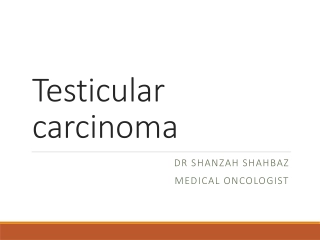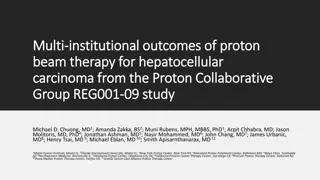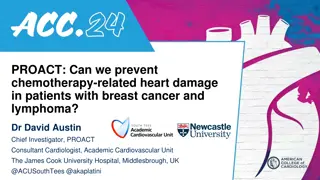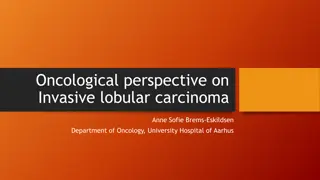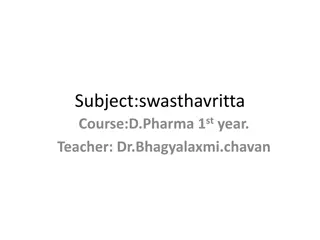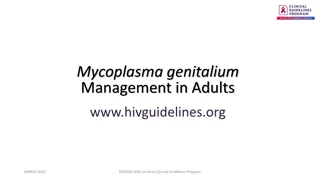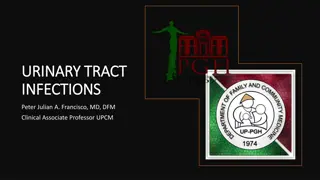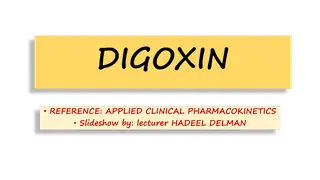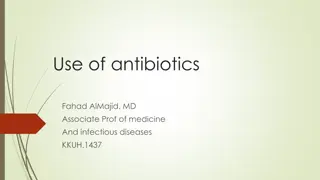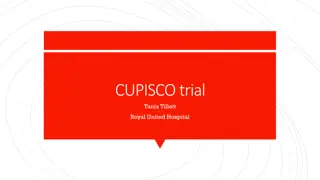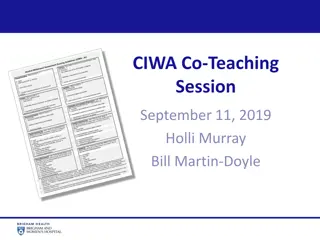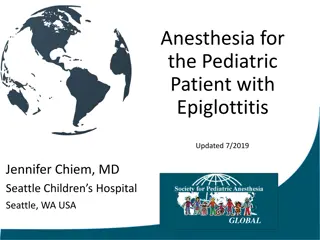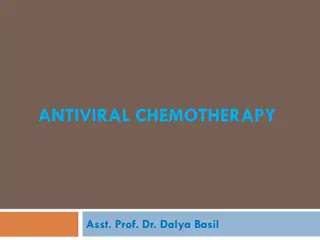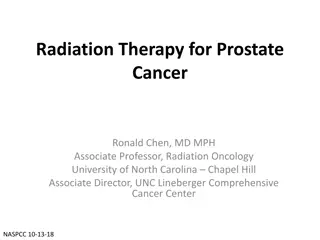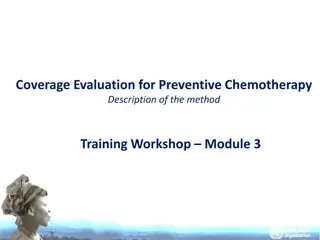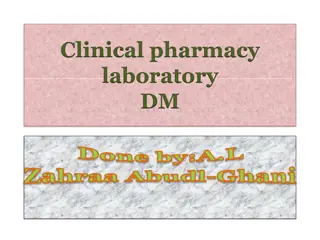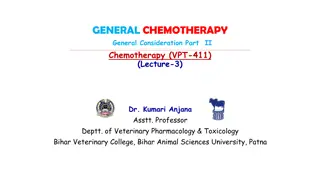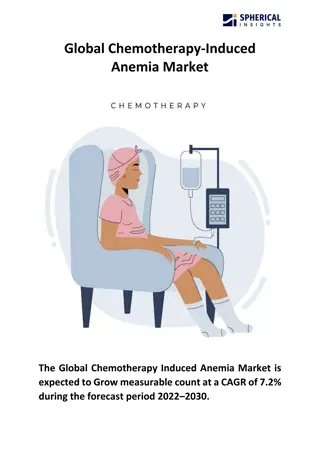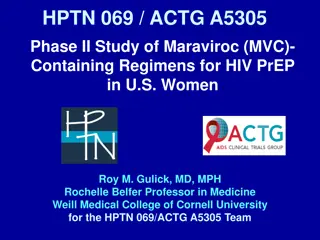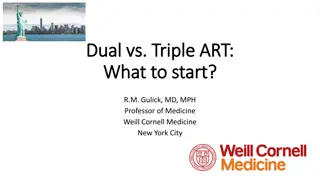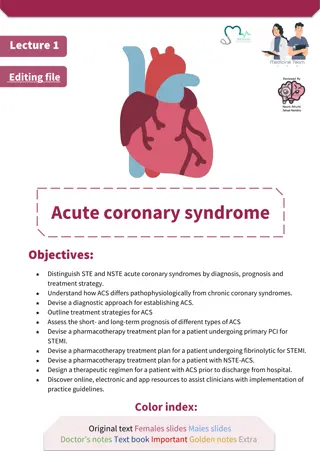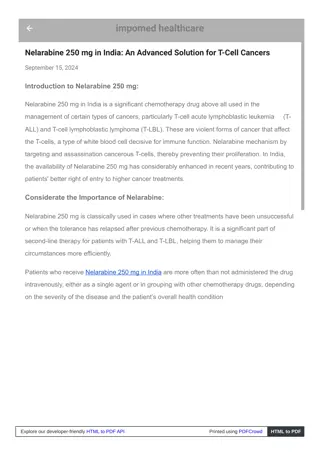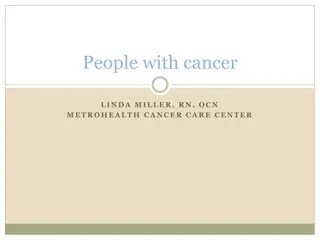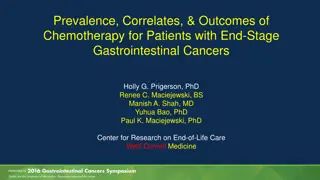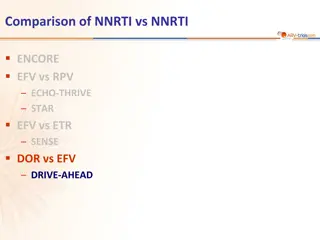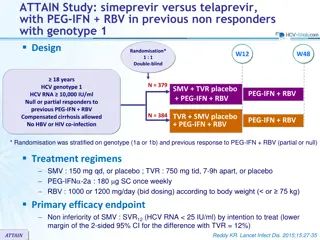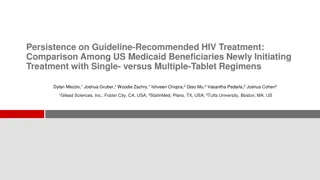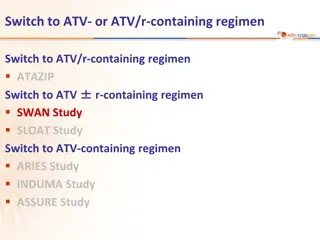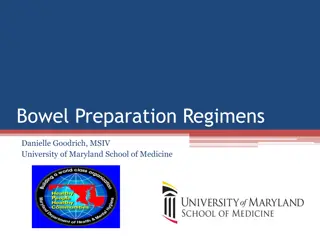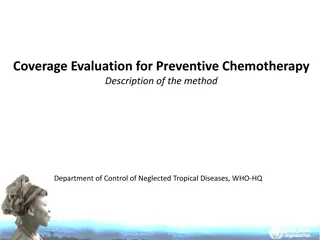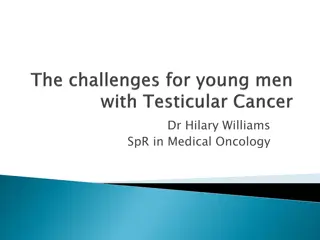Testicular carcinoma
The diagnosis and treatment options for testicular carcinoma from Dr. Shanzah Shahbaz, a medical oncologist. This comprehensive guide covers staging, tumor markers, false elevation risks, chemotherapy regimens, and management of residual masses.
2 views • 15 slides
Ticagrelor Monotherapy vs. 12-Month Dual Anti-Platelet Therapy After Coronary Stent Implantation for ACS
The study compares the efficacy of ticagrelor monotherapy after less than 1 month of dual anti-platelet therapy (DAPT) to 12-month ticagrelor-based DAPT in patients with acute coronary syndrome (ACS) undergoing percutaneous coronary intervention (PCI) with drug-eluting stent implantation. The aim is
1 views • 19 slides
Proton Beam Therapy Outcomes for Hepatocellular Carcinoma: Multi-Institutional Study
This study by the Proton Collaborative Group evaluates the outcomes of proton beam therapy for hepatocellular carcinoma across multiple institutions. Factors such as liver tolerance, baseline function, and prior therapies were considered in the treatment of liver cancer. The study emphasizes the imp
0 views • 22 slides
Pharmacokinetics Lecture: Clinical Applications and Dosage Regimens
Explore the pharmacokinetics lecture focusing on clinical implications such as changes in drug half-life in various patient conditions. Learn about dosage regimen design and optimization, including considerations for achieving therapeutic drug levels. Discover clinical situations requiring dosage ad
4 views • 53 slides
Prevention of Chemotherapy-Related Heart Damage in Breast Cancer and Lymphoma Patients: PROACT Study
Dr. David Austin leads the PROACT study aiming to prevent chemotherapy-related heart damage in breast cancer and lymphoma patients using the ACE inhibitor enalapril. The research focuses on the effectiveness of enalapril in mitigating anthracycline cardiotoxicity, crucial for reducing long-term impa
3 views • 19 slides
Oncological Perspective on Invasive Lobular Carcinoma: Challenges and Response to Chemotherapy
Guidelines and characteristics of invasive lobular carcinoma, focusing on oncological challenges, response to chemotherapy, and prognosis after neo-adjuvant treatment in patients. Highlights the importance of considering histology type for tailored treatment decisions. Discusses the effectiveness of
0 views • 20 slides
COSMETIC DENTISTRY ABU DHABI
Since every patient is different, we at Prime Cure offer individualized treatment regimens that are intended to produce outcomes that are long-lasting and natural-looking. Whether you're looking for veneers, dental implants, teeth whitening, or a full smile makeover, our professionals are dedicated
1 views • 5 slides
COSMETIC DENTISTRY ABU DHABI
Prime Cure offers customized treatment regimens that are developed to produce results that are long-lasting and natural-looking since we recognize that every patient is different. Our professionals are dedicated to providing great care in a cozy and friendly setting, whether you're looking for venee
0 views • 5 slides
COSMETIC DENTISTRY ABU DHABI
Prime Cure offers customized treatment regimens that are developed to produce results that are long-lasting and natural-looking since we recognize that every patient is different. Our professionals are dedicated to providing great care in a cozy and friendly setting, whether you're looking for venee
0 views • 5 slides
Ayurvedic Principles for Seasonal Health Maintenance
Learn about the importance of Ritucharya in Ayurveda, which emphasizes adapting diet and lifestyle according to seasonal changes to maintain optimum health. Discover the effects of Uttarayana and Dakshinayana on the body and environment, providing insights on preventive medicine and seasonal regimen
0 views • 12 slides
Mycoplasma Genitalium Management Guidelines for Adults
This guideline aims to assist clinicians in recognizing common clinical manifestations of M. genitalium infection, providing evidence-based recommendations on screening, diagnostic testing, and treatment. It emphasizes not routine screening for asymptomatic individuals but testing for those with per
1 views • 9 slides
Overview of Urinary Tract Infections in Adults: Symptoms, Diagnosis, and Treatment Guidelines
This information discusses the symptoms and diagnostic approach for urinary tract infections in adults, along with the current management guidelines. It covers the prevalence of UTIs as a common healthcare concern, focusing on uncomplicated UTIs, acute uncomplicated cystitis, and pyelonephritis. The
1 views • 35 slides
Digoxin Pharmacokinetics and Clinical Considerations
This presentation covers the pharmacokinetic parameters, dosing guidelines, therapeutic and toxic concentrations, and factors affecting digoxin clearance and distribution. It explores how digoxin clearance is linked to creatinine clearance, usual dosing regimens for adult patients, and disease state
0 views • 41 slides
Optimizing Antibiotic Use in Treating Infections
Antibiotics are vital for treating and preventing infections, but research shows they are often prescribed unnecessarily or misused. Evidence-based guidelines from IDSA can assist in choosing the right therapy based on accurate infectious disease diagnosis and microbiological understanding. Proper s
1 views • 51 slides
Molecularly-Guided Therapy vs Platinum Chemotherapy in CUP Patients
This trial aims to compare the efficacy and safety of molecularly-guided therapy or cancer immunotherapy based on genomic profiling with platinum-based chemotherapy in patients with cancer of unknown primary site. The study design includes multiple treatment regimens guided by genomic profiles, with
4 views • 9 slides
Comprehensive Overview of CIWA-Ar Scale for Alcohol Withdrawal Management
This article provides detailed information on the Clinical Institutes Withdrawal Assessment Scale for Alcohol (CIWA-Ar), focusing on its utilization in managing alcohol withdrawal symptoms. It covers learning objectives, signs and symptoms of alcohol withdrawal, complications, timelines, and the ben
0 views • 18 slides
Anesthesia in Pediatric Epiglottitis: Update 2019
Infectious and non-infectious etiologies of epiglottitis, along with epidemiology, signs, symptoms, and differential diagnosis are explained in this comprehensive guide. Anesthetic techniques and antibiotic regimens for treating pediatric patients with epiglottitis are detailed, aiding in the identi
3 views • 22 slides
Understanding Antiviral Chemotherapy: Importance and Types
Antiviral chemotherapy plays a crucial role in preventing and treating viral infections, especially when public health measures and vaccines are not sufficient. This form of treatment has been successful in combating diseases like HIV by inhibiting viral replication and targeting specific functions
1 views • 34 slides
Innovative Approaches in Radiation Therapy for Prostate Cancer
Ronald Chen, MD MPH discusses reducing radiation treatment time and the effectiveness and safety of different fractionation schedules in prostate cancer treatment. Various hypofractionation regimens are explored, with moderate hypofractionation showing promising results in clinical trials for differ
0 views • 23 slides
Analysis and Interpretation of Preventive Chemotherapy Coverage Evaluation Results
This module focuses on the analysis and interpretation of results from preventive chemotherapy coverage evaluation surveys. It includes estimating program coverage, interpreting program reach, and identifying factors affecting coverage levels such as supply chain issues and social mobilization. The
8 views • 22 slides
Clinical Pharmacy Laboratory DM and Insulin Dosing Regimens
This comprehensive content covers various insulin dosing regimens used in clinical pharmacy laboratories for patients with diabetes mellitus. It includes examples of dosing regimens before meals and at bedtime, methods of insulin administration, vial images, mixing of different types of insulin, and
0 views • 14 slides
History of Chemotherapy: From Empirical Use to Modern Era
The history of chemotherapy is divided into three phases, starting from the empirical use of compounds in ancient times to the modern era marked by targeted drug development. Ehrlich's pioneering work in the late 19th to early 20th centuries laid the foundation for understanding the selective toxici
0 views • 15 slides
Operational Research on All-Oral Shorter Regimens: Barriers and Benefits
Operational research on all-oral shorter regimens presents challenges such as funding limitations, logistical complexities, and resistance from traditional practices. However, conducting such research is crucial for optimizing treatment outcomes, enhancing patient compliance, and addressing emerging
1 views • 15 slides
Global Chemotherapy Induced Anemia Market
The Global Chemotherapy Induced Anemia Market Size is expected to reach USD 3.99 billion by 2030, at a CAGR of 7.2% during the forecast period 2021 to 2030.\n
1 views • 4 slides
Study of Maraviroc-Containing Regimens for HIV PrEP in U.S. Women: HPTN 069/ACTG A5305 Phase II Study
HPTN 069/ACTG A5305 is a Phase II study evaluating the safety and tolerability of Maraviroc (MVC)-containing regimens compared to Tenofovir/emtricitabine (TDF/FTC) for HIV Pre-Exposure Prophylaxis (PrEP) in at-risk women. The study involves a randomized, double-blind, placebo-controlled design with
0 views • 18 slides
Evolution of Antiretroviral Therapy: Dual vs. Triple ART
The evolution of antiretroviral therapy (ART) from dual to triple drug regimens has been crucial in improving outcomes for HIV patients. Research findings demonstrate the superiority of three-drug therapy over two-drug therapy in terms of efficacy and resistance management. Maintenance ART strategie
0 views • 17 slides
Understanding Acute Coronary Syndrome Differentiation and Treatment
Learn to distinguish between STE and NSTE acute coronary syndromes in terms of diagnosis, prognosis, and treatment strategies. Understand the pathophysiological differences between ACS and chronic coronary syndromes. Gain insight into diagnostic approaches, treatment regimens, and prognosis for vari
0 views • 15 slides
Nelarabine 250 mg in India: A Crucial Chemotherapy for T-cell Leukemia and Lymph
This PDF provides an in-depth overview of Nelarabine 250 mg, a vital chemotherapy drug used for treating aggressive cancers like T-cell acute lymphoblastic leukemia (T-ALL) and T-cell lymphoblastic lymphoma (T-LBL) in India. Learn about Nelarabine 25
0 views • 4 slides
Understanding Cancer Treatments and Side Effects
Explore the different modes of cancer treatment including surgery, radiation, and chemotherapy. Learn about the side effects of therapy such as fatigue, nausea, and skin issues. Discover how advancements like oral chemotherapy are changing the landscape of cancer care and the precautions needed to h
0 views • 23 slides
Chemotherapy Utilization in End-Stage Gastrointestinal Cancer Patients
This presentation explores the prevalence, correlates, and outcomes of chemotherapy use in patients with end-stage gastrointestinal cancers. Data is presented on the frequency of chemotherapy administration, correlates, harms, and benefits in patients in their final months of life. Insights from stu
0 views • 21 slides
Comparison of NNRTI vs NNRTI and DRIVE-AHEAD Study: DOR/3TC/TDF vs EFV/FTC/TDF
The comparison study explores NNRTI regimens alongside the DRIVE-AHEAD trial, focusing on DOR/3TC/TDF vs EFV-FTC/TDF. DRIVE-AHEAD assesses the efficacy and safety of DOR in ARV-naïve HIV patients, aiming for non-inferiority based on virologic response, with DOR exhibiting potential neuropsychiatric
0 views • 11 slides
Comparison of Simeprevir vs. Telaprevir in HCV Genotype 1 Non-Responders
The ATTAIN study compared simeprevir and telaprevir in previous non-responders with genotype 1 HCV. The study included 379 patients with simeprevir and 384 with telaprevir, focusing on SVR12 as the primary endpoint. Baseline characteristics, treatment regimens, patient disposition, and virologic out
0 views • 6 slides
Chemotherapy for Brain Cancer Understanding the Options
Chemotherapy is a cancer treatment that uses drugs to kill cancer cells with Neuro Surgery oncology. These drugs can be administered intravenously, orally, or directly into the brain. The goal of chemotherapy is to shrink tumors, prevent cancer cells
0 views • 3 slides
Innovative Approaches in Salvage Chemotherapy for Hodgkin Lymphoma
Salvage chemotherapy plays a significant role in treating relapsed or refractory Hodgkin lymphoma patients before undergoing high-dose chemotherapy and autologous stem cell transplantation. Recent studies highlight the promising results of various salvage regimens, including functional imaging-based
0 views • 23 slides
Comparison of Persistence on Guideline-Recommended HIV Treatment Among US Medicaid Beneficiaries
This study compares the persistence rates of newer DHHS guideline-recommended single- and multiple-tablet regimens for treatment-naive patients living with HIV. The analysis utilized the All-Payer Claims Database to assess treatment patterns among Medicaid beneficiaries, highlighting the importance
1 views • 19 slides
SWAN Study: Switch to ATV-Containing Regimen in HIV Patients
The SWAN Study compared switching HIV patients from a protease inhibitor (PI)-based regimen to atazanavir (ATV)-containing regimens to evaluate non-inferiority in virologic rebound rates at week 48. The study showed lower virologic rebound rates in patients on ATV compared to PI, with higher efficac
0 views • 8 slides
Bowel Preparation Regimens for Colorectal Cancer Screening
Overview of bowel preparation regimens for colorectal cancer screening, emphasizing the importance of adequate bowel cleansing to enhance the effectiveness of colonoscopy. Highlights the impact of different dosing regimens on patient compliance, colon cleansing, and detection rates of small polyps.
0 views • 20 slides
Coverage Evaluation for Preventive Chemotherapy
Methods for evaluating treatment coverage in preventive chemotherapy for neglected tropical diseases (NTDs) are crucial for achieving disease control and elimination goals. Routine data can be unreliable due to various biases and errors, highlighting the importance of population-based surveys for pr
0 views • 21 slides
Survivorship Issues and Treatment Advances in Testicular Cancer
Testicular cancer poses challenges impacting fertility, sexuality, and body image. Treatment involves chemotherapy, surgery, and clinical trials. Survivorship issues include early problems, toxicities, and late effects, highlighting the need for life-stage support. Innovations in tailored chemothera
0 views • 13 slides
Summary of NSABP Protocols in Breast Cancer Studies
NSABP conducted various adjuvant and neoadjuvant trials (B-15, B-18, B-22, B-23, B-28, B-30, B-27, B-40) involving different treatment arms and patient populations with operable breast cancer. Trials included chemotherapy regimens with Adriamycin, cyclophosphamide, tamoxifen, and radiation therapy,
0 views • 11 slides
